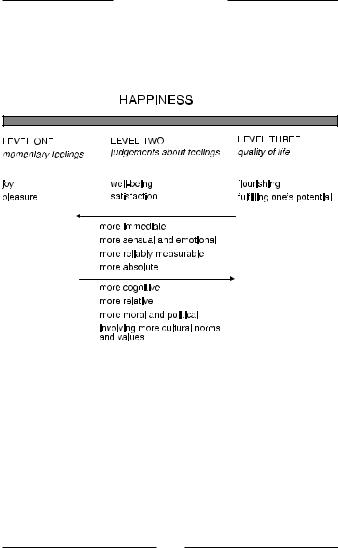
Books on Happiness / Happiness_ The Science Behind Your Smile
.pdf
COMFORT AND JOY
emotions—fear, sadness, disgust, anger, surprise, and joy—which are universally recognized. As well as agreeing which expression goes with which feeling, people across cultures agree which feeling goes with which situation. A snake in the picnic hamper, that’s fear; the death by natural causes of a loved one, that’s sadness; the contamination of the food you are eating by faeces, that’s disgust; and the unexpected arrival of someone you love and miss terribly, that’s joy. These emotions may be hard to define, but people from diverse cultures know them when they see them, and since they look like they come as standard features on your basic model Homo sapiens, we ought to find out how they work and what they are for. Interestingly, Ekman’s work means that in the field of emotion research, the same notions that turn up in ordinary conversation also turn up in academic psychology papers.
Another important development has been the birth of evolutionary psychology. This influential perspective, which is very much in vogue at present, tries to explain features of the way our minds work with reference to the evolutionary challenges those minds were designed to solve. At some level evolutionary psychology has to be true. Every single one of our ancestors managed to stay alive until reproductive age, find a mate, and rear a child to adulthood. Most people throughout most of
12

COMFORT AND JOY
human history have not managed this, so our progenitors must have either had innately, or been able to learn, pretty smart ways of coping with the challenge. Of course, how much about the detail of how the mind works can be predicted from these truths is still something to be worked out.
The important thing about evolutionary psychology, though, is not that it says evolution has shaped everything we now do—it hasn’t directly shaped mobile telephony or abstract expressionism—but that evolution has shaped the enduring ways we have for thinking about things. To take an example from leading evolutionary psychology theorists Leda Cosmides and John Tooby, again and again over evolutionary time, we faced the problem of a large carnivore running at speed towards us. Such a moment is really not the time to run through all possible subtleties of carnivore biology, the aesthetics of the big cat, or the relative merits of various responses to the situation. We want a ready-to-roll way of thinking—a software package that will start itself automatically when the cue comes—that has communication lines to key players like the heart and the legs already set up. None of our ancestors got eaten, so it is a fair bet that they were all running the best version of this particular programme. The programme—fear— might lead us to do things in modern life that are really
13

COMFORT AND JOY
stupid—for example, hiding under our seats whilst watching the film of Jurassic park—but having it has been advantageous over evolutionary time. The ways people become afraid today reflect the design features of the fear programme. (For example, people today are more afraid of Mad Cow epidemics and spiders than they are of electrical sockets and automobiles, which statistically is totally senseless. We are much more likely to be killed in an accident while driving during the course of one month than we are from eating infected beef in our entire lifetime. But there were food-transmitted epidemics and venomous spiders in Palaeolithic Africa, and no lunatics in Range Rovers.)
Evolutionary psychology thus makes it respectable to study the idea of happiness. Because people all over the world, and at different historical times, have thought about it, wanted it, debated it, maybe, like fear, it is a programme that is there for a reason. This will be the foundation of my argument in this book, though it turns out to be a little more complex. Joy certainly looks like a pre-specified programme in much the same way as fear. Happiness in its other senses is more complex. I will argue that what we are programmed for by evolution is not happiness itself, but a set of beliefs about the kinds of things that will bring happiness, and a disposition to pursue them. This makes sense of several
14

COMFORT AND JOY
consistent but puzzling findings: that people believe they will be more happy in the future than they are now, but in fact seldom are; that societies don’t get happier as they get richer; and that people are consistently wrong about the impact of future life events on their happiness.
Ekman’s work on emotions and evolutionary psychology are just two current trends that have joined what is now a broad flow of serious research on happiness. This movement has been known by various names, but the best is hedonics, the study of happiness (as opposed to hedonism, its pursuit). The seminal bibliography of hedonics contains more than 3000 studies published since 1960, and there has been, since 2000, a trade journal, the Journal of happiness studies. The members of this broad research effort include brain scientists, clinicians interested in preventing depression, social scientists interested in measuring human development in different countries, and economists interested in explaining people’s consumption choices. It is an impressively interdisciplinary effort, since happiness is hard to pin down within any narrow set of concerns. Happiness is now returning to the central position in the human sciences that Jeremy Bentham assumed it would take.
*
15

COMFORT AND JOY
This groundwork done; what, then, is happiness? The concept is slippery, but this does not negate its value. Happiness belongs to that class of concepts of which all the specific examples are related, like members of a family. That is to say, they all have something in common, but there is no one thing that shows up in all of them and in nothing else. The notion of happiness, helpfully for us, shows up in culture after culture. Many languages draw the distinction between something very immediate like joy or pleasure, and something more lasting and considered, like satisfaction or contentment (e.g. Italian gioa versus felicitá). Note that whilst there might be quite a lot of gioa involved in a state of felicita, you would not have to be joyful all the time for the longer state to count as a happy one. In some languages, there is a specific lexical link between happiness and good luck (German Gluck/glucklich happy/lucky; good hap in English originally meant good luck). This suggests that something in the happiness family is to do with things turning out better than it was reasonable to expect. Thus, being happy might not always be an absolute state, but contains implicit comparison with an expectation or with what other people have.
These observations are sufficient to allow us to begin to sketch the semantic terrain of happiness. Most usages of the term can be classified into one of three increas-
16

COMFORT AND JOY
ingly inclusive senses (Fig. 1.2). The most immediate and direct senses of happiness involve an emotion or feeling, something like joy or pleasure. These feelings are transient and have an unmistakable and particular phenomenology—that is to say, paraphrasing Thomas Nagel, there is something which joy feels like. The feeling is brought on by a desired state being (perhaps unexpectedly) attained, and there is not much cognition involved, beyond the recognition that the desired thing has happened. With apologies for the barbaric terminology, we will henceforth call this sense of happiness ‘level one happiness’.
When people say that they are happy with their lives, they do not usually mean that they are literally joyful, or experiencing pleasure, all of the time. They mean that, upon reflection on the balance sheet of pleasures and pains, they feel the balance to be reasonably positive over the long term. This is happiness in the sense usually studied by psychologists. It concerns not so much feelings, as judgements about the balance of feelings. Thus it is a hybrid of emotion, and judgement about emotion. Its synonyms are things like contentment and life satisfaction. This is ‘level two happiness’. It is clear that when Bentham talked about the greatest happiness to the greatest number being the foundation of morals and legislation, he meant happiness in a level two
17

COMFORT AND JOY
Fig. 1.2 Three different senses of the term ‘happiness’. Each level includes the content of the level below, plus some additional things.
18

COMFORT AND JOY
sense; the long-term balance of positive and negative emotions across time and individuals.
Level two happiness, though, is not calculated by a simple summing up of all the positive moments and a subtraction of the negative ones. It also involves more complex cognitive processes, such as comparison with alternative possible outcomes. Thus I could say, ‘I am happy about how the first draft of my book came out’, in the full knowledge that the first draft is dreadful. If I always write dreadful first drafts, but find it easier to revise them into good shape than I do to get the text down onto the page initially, then this makes perfect sense. I could be happy relative to my expectation that it would be awful, and my belief that the hard work is done by that point. Or, to take another example, if I usually cut myself shaving twice a day, then I could be happy to have cut myself just once today. However, it is unlikely that I took pleasure from the cut. The cut was a painful event which made me swear; the happiness stems from the subsequent processes that compared the pain I went through with the pain I expected or had experienced yesterday.
There are yet broader senses of happiness. Aristotle’s ideal of the good life, eudaimonia, is sometimes translated as ‘happiness’. However, what is meant by eudaimonia is a life in which the person flourishes, or
19

COMFORT AND JOY
fulfils their true potential. Though such a life could include many positive emotional experiences, it is not actually part of its definition that it need do so. Contemporary psychologists and philosophers have sometimes talked of happiness when they really mean the good life or eudaimonia. When they do so, we shall call this usage a level three sense of the term happiness. Note that ‘level three happiness’ has no characteristic phenomenology since it is not an emotional state. There is no single thing that it feels like to achieve eudaimonia, since everyone’s potential is different. Indeed, one of the problems of eudaimonia and related constructs is that it is not clear who is to be the judge of what one’s full potential is. If the judge is the subject herself then the concept is a properly psychological one, and useful in our discussion of happiness. If the judge is a psychologist, or society, imposing some external standard of what one should do with life, then the concept has become a moralizing one; an ideology, in fact. But, at least within any liberal tradition of thought, happiness should not be moralized. As long as people do not harm each other, then it is their inalienable right to construe their own potential in any way they like. To find a definition of happiness that is broad enough to capture the full range of human goods, but does not become an
20

COMFORT AND JOY
ideological position, is an extremely hard balance to strike, as we shall see.
In addition to the three levels of the ordinary meaning of happiness shown in Fig. 1.2, some scholars have used the term simply to mean the attainment of whatever it is that people want. This is particularly evident in economics. Jeremy Bentham and the classical economists hypothesized that people make their choices in life so as to maximize their happiness, or, as it was called, utility. By utility, they meant happiness in a level two sense. That is, they believed that if you had a pleasure-measuring device, then you would be able to show that the choices people made were the ones that maximized the balance of pleasurable feelings over painful ones. However, the lack of any practical way of measuring happiness or utility meant that, over time, economists took the utility of an outcome simply to mean the propensity of people to choose it. For example, if people prefer to spend money on cars rather than boats, then economists say that having a car gives greater utility than having boats. This is not a psychological hypothesis. Indeed, it is not an explanatory claim at all. The greater utility of cars cannot explain why people choose them, since the greater utility of cars is defined as the propensity of people to choose them. The concept is therefore merely a
21
